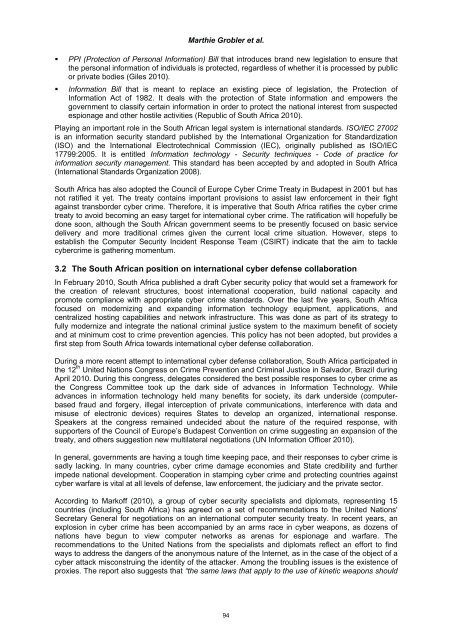6th European Conference - Academic Conferences
6th European Conference - Academic Conferences
6th European Conference - Academic Conferences
You also want an ePaper? Increase the reach of your titles
YUMPU automatically turns print PDFs into web optimized ePapers that Google loves.
Marthie Grobler et al.<br />
PPI (Protection of Personal Information) Bill that introduces brand new legislation to ensure that<br />
the personal information of individuals is protected, regardless of whether it is processed by public<br />
or private bodies (Giles 2010).<br />
Information Bill that is meant to replace an existing piece of legislation, the Protection of<br />
Information Act of 1982. It deals with the protection of State information and empowers the<br />
government to classify certain information in order to protect the national interest from suspected<br />
espionage and other hostile activities (Republic of South Africa 2010).<br />
Playing an important role in the South African legal system is international standards. ISO/IEC 27002<br />
is an information security standard published by the International Organization for Standardization<br />
(ISO) and the International Electrotechnical Commission (IEC), originally published as ISO/IEC<br />
17799:2005. It is entitled Information technology - Security techniques - Code of practice for<br />
information security management. This standard has been accepted by and adopted in South Africa<br />
(International Standards Organization 2008).<br />
South Africa has also adopted the Council of Europe Cyber Crime Treaty in Budapest in 2001 but has<br />
not ratified it yet. The treaty contains important provisions to assist law enforcement in their fight<br />
against transborder cyber crime. Therefore, it is imperative that South Africa ratifies the cyber crime<br />
treaty to avoid becoming an easy target for international cyber crime. The ratification will hopefully be<br />
done soon, although the South African government seems to be presently focused on basic service<br />
delivery and more traditional crimes given the current local crime situation. However, steps to<br />
establish the Computer Security Incident Response Team (CSIRT) indicate that the aim to tackle<br />
cybercrime is gathering momentum.<br />
3.2 The South African position on international cyber defense collaboration<br />
In February 2010, South Africa published a draft Cyber security policy that would set a framework for<br />
the creation of relevant structures, boost international cooperation, build national capacity and<br />
promote compliance with appropriate cyber crime standards. Over the last five years, South Africa<br />
focused on modernizing and expanding information technology equipment, applications, and<br />
centralized hosting capabilities and network infrastructure. This was done as part of its strategy to<br />
fully modernize and integrate the national criminal justice system to the maximum benefit of society<br />
and at minimum cost to crime prevention agencies. This policy has not been adopted, but provides a<br />
first step from South Africa towards international cyber defense collaboration.<br />
During a more recent attempt to international cyber defense collaboration, South Africa participated in<br />
the 12 th United Nations Congress on Crime Prevention and Criminal Justice in Salvador, Brazil during<br />
April 2010. During this congress, delegates considered the best possible responses to cyber crime as<br />
the Congress Committee took up the dark side of advances in Information Technology. While<br />
advances in information technology held many benefits for society, its dark underside (computerbased<br />
fraud and forgery, illegal interception of private communications, interference with data and<br />
misuse of electronic devices) requires States to develop an organized, international response.<br />
Speakers at the congress remained undecided about the nature of the required response, with<br />
supporters of the Council of Europe’s Budapest Convention on crime suggesting an expansion of the<br />
treaty, and others suggestion new multilateral negotiations (UN Information Officer 2010).<br />
In general, governments are having a tough time keeping pace, and their responses to cyber crime is<br />
sadly lacking. In many countries, cyber crime damage economies and State credibility and further<br />
impede national development. Cooperation in stamping cyber crime and protecting countries against<br />
cyber warfare is vital at all levels of defense, law enforcement, the judiciary and the private sector.<br />
According to Markoff (2010), a group of cyber security specialists and diplomats, representing 15<br />
countries (including South Africa) has agreed on a set of recommendations to the United Nations'<br />
Secretary General for negotiations on an international computer security treaty. In recent years, an<br />
explosion in cyber crime has been accompanied by an arms race in cyber weapons, as dozens of<br />
nations have begun to view computer networks as arenas for espionage and warfare. The<br />
recommendations to the United Nations from the specialists and diplomats reflect an effort to find<br />
ways to address the dangers of the anonymous nature of the Internet, as in the case of the object of a<br />
cyber attack misconstruing the identity of the attacker. Among the troubling issues is the existence of<br />
proxies. The report also suggests that “the same laws that apply to the use of kinetic weapons should<br />
94

















